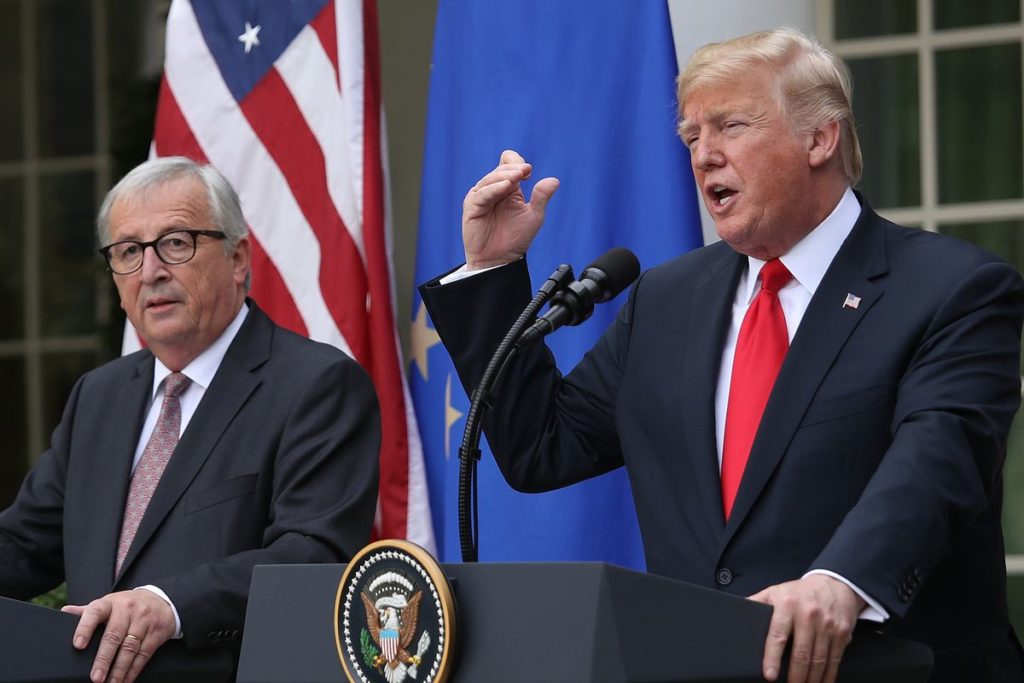It has been a rollercoaster of a month for trade relations between the US and its biggest economic partner.
In late August, trade prospects between the US and European Union seemed high, with President Trump saying he thinks he is close to reaching an agreement with Brussels on trade. Just three weeks later, a WTO ruling allowed Trump to impose tariffs on the EU, probably mounting up to €8 billion that may just trigger a full-blown trade war.
Concerns are heightened that the tensions in the trade relationship (which favours the EU by $115 billion) will have severe implications for US-Europe cooperation. Incoming European Commission President Ursula von der Leyen and EU trade commissioner Phil Hogan are preparing for what may be a long slog on trade with the self-proclaimed “Tariff Man.”
The Trump Administration, already known for unilateral decision making, has largely been a one man show in conducting trade and imposing tariffs.
Brussels has only stoked this behaviour by giving all its attention to the Oval Office. Incoming EU trade commissioner Phil Hogan stated in an interview that “We are going to do everything we possibly can to try to get Mr. Trump to see the errors of his ways.”
The EU must not forget that President Trump conducts trade on behalf of the American people. The European Union should stop considering President Trump the be-all-end-all of improving US-EU economic ties.
Going forward, Congress needs to be included in the conversation for best results.
Congress has a constitutional role over foreign commerce, and therefore a direct interest in monitoring and shaping US-EU trade negotiations. This constitutionally-defined authority of Senators and Representatives over US trade policy gives precedent for EU negotiators to seek Congressional inclusion in trade talks.
President Trump isn’t likely to willingly give up his delegated authority in trade. However, support for wrestling back Congressional oversight in trade has begun to come out of the woodwork.
Last week, an industry coalition urged Congress to rein in the President’s ability to unilaterally impose tariffs. Senators such as Jerry Moran (R-Kansas) and Chuck Grassley (R-Iowa) plan to look at legislation that would limit the President’s ability to impose tariffs at his own will.
If the will to return trade authority to Congress continues to grow, Brussels would be better prepared for changes to the ‘rules of the game’ by looking to Capitol Hill sooner rather than later.
Including a Congressional voice in trade negotiations will also be of huge benefit to the EU due to Capitol Hill’s receptive attitude toward sustaining and even deepening US-Europe ties.
For example, during this Administration, which has been sceptical of NATO, both chambers have introduced legislation that reaffirms US support for the alliance. Congress may also be receptive to how trade cooperation can address issues of mutual concern, such as China’s trading practices.
Some issues remain; many lawmakers are critical of Europe’s defence spending levels, increasing European dependence on Russian gas, and a desire to include agriculture in US-EU trade talks.
Nevertheless, the fact that Congress is significantly more receptive to increasing transatlantic cooperation makes it a no-brainer that Europe should find ways to show Capitol Hill that they want to talk.
Lastly, the goods and services in these trade discussions are made by the American people. It is the factories, businesses, and households at the centre for American communities that will bear the benefits and consequences of these talks.
As long as agriculture remains a sticking point, it will be American farms that are affected. The burden of these trade talks are borne by the American public.
It, therefore, makes sense to include their representatives in the conversation.
Jonathan Roberts


